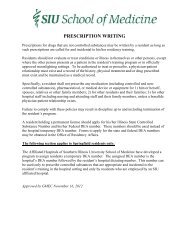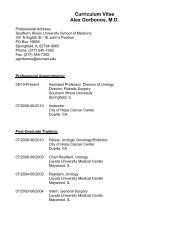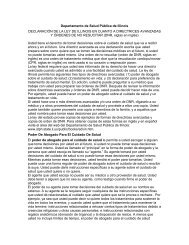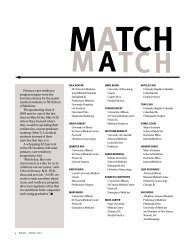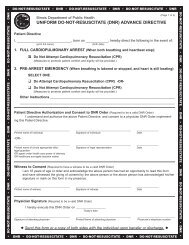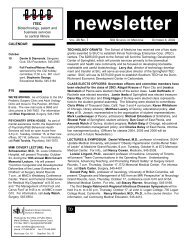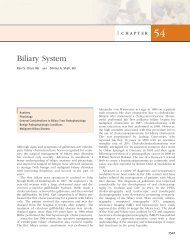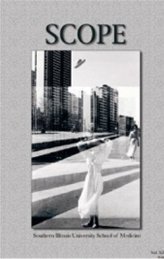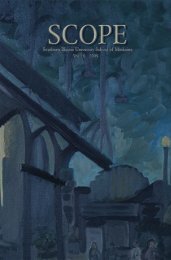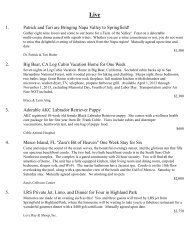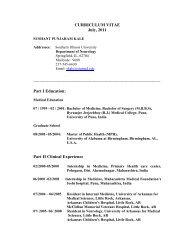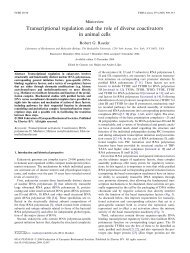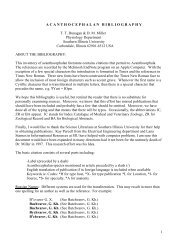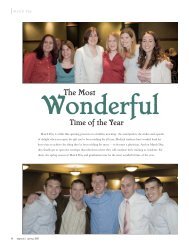Responsible Use Guidelines - SIU School of Medicine
Responsible Use Guidelines - SIU School of Medicine
Responsible Use Guidelines - SIU School of Medicine
Create successful ePaper yourself
Turn your PDF publications into a flip-book with our unique Google optimized e-Paper software.
RESIDENT WELLNESS<br />
Residency training is a time <strong>of</strong> tremendous personal and pr<strong>of</strong>essional growth. It can also be very<br />
stressful. It is not at all uncommon for residents from time to time to feel stressed, overwhelmed,<br />
burned-out, or even to develop clinical depression. If you should experience any <strong>of</strong> these, we<br />
encourage you to seek or accept help. You do not need to shoulder these burdens alone. If you are<br />
feeling overwhelmed, find someone you trust to talk to, whether it be a colleague, friend or family<br />
member, your doctor, a religious advisor, or your program director. For any resident who needs<br />
some pr<strong>of</strong>essional assistance, multiple resources are available. A list <strong>of</strong> resources can be viewed at<br />
http://www.siumed.edu/resaffairs/ResidentInfo/wellness.html.<br />
FATIGUE<br />
Acute and chronic sleep loss can substantially impair physical, cognitive, and emotional<br />
functioning in human beings. Overworked residents report sleepiness tendencies that are<br />
equivalent to those found in some clinical populations <strong>of</strong> patients with sleep apnea or narcolepsy.<br />
After one night <strong>of</strong> missed sleep, cognitive performance may decrease by as much as 25%. Sleep<br />
debt tends to accumulate until enough catch up sleep is obtained.<br />
Chronic sleep loss results in lower cognitive and fine motor performance, and has negative effects<br />
on mood, motivation, life satisfaction and on pr<strong>of</strong>essional and personal relationships. Fatigued<br />
drivers are at higher risk for accidents and near accidents.<br />
It is the policy <strong>of</strong> <strong>SIU</strong> that all duty hours must be consistent with ACGME requirements. Programs<br />
are responsible for monitoring resident activities to ensure that resident fatigue does not contribute<br />
to diminished learning or detract from patient safety. Residents can help by ensuring that they get<br />
enough sleep during their <strong>of</strong>f hours and by monitoring themselves for the following signs <strong>of</strong><br />
fatigue:<br />
1. Sluggish thinking or inability to concentrate.<br />
2. Inability to stay awake in the absence <strong>of</strong> external stimulation.<br />
3. Irritability.<br />
4. Tremors.<br />
A resident experiencing any <strong>of</strong> these symptoms must immediately get some rest. The most<br />
effective strategy to counter fatigue is sleep. Even a short nap can temporarily reverse the impact<br />
<strong>of</strong> sleep loss. Any resident who is experiencing these symptoms or feeling overly fatigued at the<br />
end <strong>of</strong> his or her work day should take a short nap before driving home or catch a ride with a coworker<br />
or taxi. If you take a taxi home, submit your receipt to the Office <strong>of</strong> Residency Affairs<br />
and they will reimburse you.<br />
NAPPING SPACE/SLEEP ROOMS<br />
Sleep rooms have been identified at both hospitals to accommodate napping. Contact your<br />
program coordinator or the Office <strong>of</strong> Residency Affairs for the location and entry code to these<br />
rooms.<br />
Page 22



